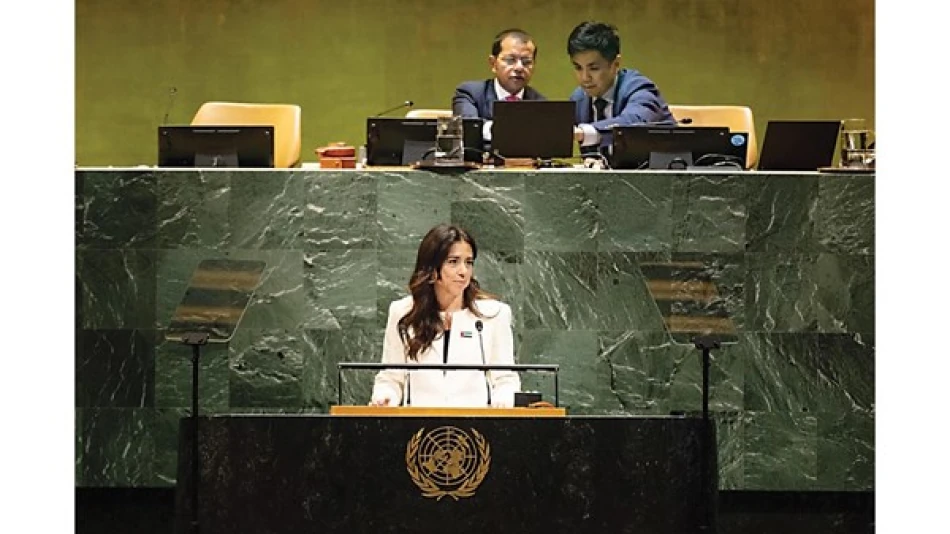
UAE Embraces Wisdom and Sincere Humanitarian Diplomacy
The United Arab Emirates reinforced its commitment to diplomatic solutions and peace-building at the UN General Assembly's 80th session, calling for immediate ceasefires in Gaza and Sudan while condemning attacks on civilian populations. The Gulf nation positioned itself as a mediator in regional conflicts, highlighting its role in prisoner exchanges between Russia and Ukraine and hosting peace talks between Azerbaijan and Armenia.
Speaking before the UN General Assembly, UAE Minister of State Lana Nusseibeh drew parallels between today's global challenges and the world's situation 80 years ago after World War II. "When the world stood on the ruins of war eighty years ago, it found itself at a pivotal moment that required transitioning to a new system," she said, emphasizing how the UAE has chosen wisdom and de-escalation over conflict.
The UAE's diplomatic approach has yielded concrete results. The country facilitated the exchange of thousands of prisoners between Russia and Ukraine and hosted peace negotiations between Azerbaijan and Armenia. This hands-on mediation reflects the UAE's broader strategy of building bridges rather than managing conflicts.
**Middle East Tensions and Two-State Solution**
On the Palestinian-Israeli conflict, the UAE condemned attacks on civilians from all sides while reaffirming its support for a two-state solution. Nusseibeh stressed that no justification exists for targeting tens of thousands of civilians, besieging them, starving them, or forcing their displacement. She equally condemned the taking of civilian hostages.
The UAE specifically denounced Israel's recent attack on Qatar, calling it a blatant violation of sovereignty and a breach of fundamental principles of international law. This criticism signals the UAE's growing concern about regional escalation beyond the Gaza conflict.
Despite ongoing tensions, the UAE continues as the largest aid donor to Gaza, using all available relationships and resources to deliver humanitarian assistance. The country welcomed growing international recognition of Palestinian statehood and called on other nations to follow suit.
**Regional Sovereignty Issues**
The UAE renewed its call for Iran to end its occupation of three Emirati islands - Greater Tunb, Lesser Tunb, and Abu Musa. The country continues pushing for direct negotiations or referral to the International Court of Justice to resolve this decades-old dispute.
In Sudan, where civilian populations face famine-level conditions, the UAE emphasized the need for immediate ceasefire and unobstructed humanitarian aid delivery. The country stressed that sustainable peace requires civilian government transition, not military solutions.
**Climate and Technology Leadership**
The UAE highlighted its growing investments in international climate action, reaffirming its commitment to implementing the "UAE Agreement" from COP28 held in Dubai in 2023. The country is expanding clean energy solutions and innovative approaches to environmental challenges.
Water scarcity represents another focus area, with the Mohammed bin Zayed Water Initiative supporting advanced technologies for sustainable water access. The UAE will co-host the UN Water Conference next year with Senegal, aiming to boost international cooperation and investment in innovation.
In artificial intelligence and technology, the UAE emphasizes responsible and ethical use while respecting national values and priorities. The country is building technological capabilities globally while ensuring compliance with international law.
**UN Reform and Multilateral Cooperation**
The UAE called for reforming international institutions, particularly the UN Security Council, to better serve current global needs. The country views the UN's eightieth initiative as an opportunity to strengthen the organization's capabilities with a clear future vision for coming decades.
This reform vision aligns with the UAE's national approach under President Sheikh Mohammed bin Zayed Al Nahyan, focusing on an effective and just international system capable of serving humanity through collective action for comprehensive and sustainable results.
The UAE has doubled its external economic investments in diverse projects, expanding partnerships especially with Global South countries, including African nations across various sectors. This reflects the country's belief that openness and communication drive shared development, prosperity, and stability.
As international institutions face weakening and international law faces undermining, the UAE emphasized shared responsibility for ensuring the continuity of the international system and restoring its credibility for future generations.
Most Viewed News

 Layla Al Mansoori
Layla Al Mansoori






